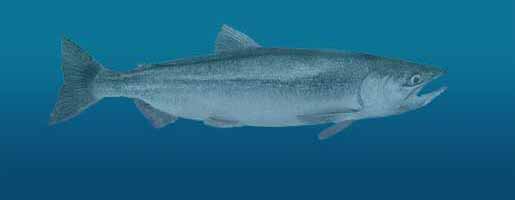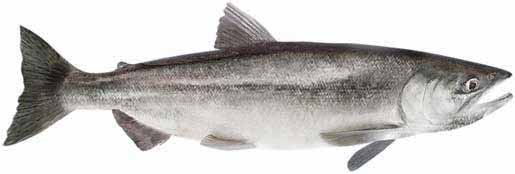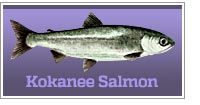Fishing For Salmon In North Carolina
Guide to catching kokanee salmon in NC
Last updated on .

Salmon Fishing Options
Kokanee Salmon
Kokanee salmon, a landlocked form of sockeye salmon, can be found in only one lake in North Carolina. Lake Nantahala is the only freshwater lake in North Carolina that offers salmon fishing. There is a population of kokanee salmon that reach over three pounds. These fish are prized for their brilliant red color and tasty flesh. They are not the same as the ocean-run salmon species, but they still provide an exciting angling experience. Fish for them around structure with distinct drop-offs and depth changes. Typically kokanee average one to two pounds. They are plankton feeders and very sensitive to water temperature. They school in lakes at depths which remain ideal temperatures. Once this depth is identified, schools can be found where they are easily caught. Use small lures trolled at the appropriate depth. The can also be caught using corn, but the main way they are caught is using flashy lures which they attack when the lure intrudes their space. Kokanee salmon are known for their hard-fighting nature, making them a sought-after catch among anglers. The current Colorado state record for kokanee salmon stands at over 7 pounds, caught in Blue Mesa Reservoir. Anglers can target kokanee salmon using techniques such as trolling with flashy lures or using downriggers to reach deeper waters where the fish reside.
Other than their smaller size, kokanee have very similar markings and characteristics to the sockeye. Since they live in a lake for most of their lives, you can usually locate them spawning near tributary waters that feeds into a lake.
North Carolina is not known for kokanee salmon fishing, as this species is typically found in the western parts of North America, particularly in the Pacific Northwest. Kokanee salmon are landlocked sockeye salmon and are primarily found in freshwater lakes and reservoirs.
However, North Carolina does offer a variety of other exciting fishing opportunities, including saltwater fishing along its extensive coastline and freshwater fishing in its numerous lakes, rivers, and streams. Anglers in North Carolina can target a wide range of species such as largemouth bass, smallmouth bass, catfish, trout, striped bass, and more.
While kokanee salmon may not be a big part of North Carolina's fishing landscape, anglers in the state can explore the diverse fishing opportunities available to them and try their luck at landing trophy-sized fish in their respective species. It's always a good idea to check local regulations and licensing requirements before embarking on a fishing adventure in North Carolina.
Click the images and links above for species details.
The state record kokanee salmon was caught out of Nantahala Lake.
About The Pacific Salmon Family
Pacific Salmon are born in and remain in freshwater streams for the early years of life. The number varies by species. Afterward they migrate to the Pacific Ocean waters where they bulk up and prepare for their once in a lifetime spawning run up the freshwater stream where they were born. They will instinctively return to their birthplace, spawn and die. They are found in the streams which empty into the ocean and adjoining ocean waters.
North Carolina Salmon Fishing
The preferred method for catching salmon is fly fishing. Depending on the activity level, salmon may be caught on wet or dry flies, as well as a variety of other lures and baits.
Salmon fishing waters and information, by state
021726
NORTH CAROLINA





